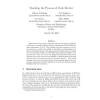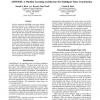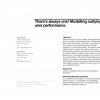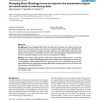1503 search results - page 50 / 301 » Improving Student Performance Using Self-Assessment Tests |
ASWEC
2004
IEEE
14 years 18 days ago
2004
IEEE
Behavioural theory predicts that interventions that improving individual reviewers' expertise improves Software Development Technical Review group performance [3, p 6]. This ...
AAAI
2000
13 years 10 months ago
2000
We have constructed ADVISOR, a two-agent machine learning architecture for intelligent tutoring systems (ITS). The purpose of this architecture is to centralize the reasoning of a...
UMUAI
2008
13 years 8 months ago
2008
Abstract. Self-efficacy is an individual's belief about her ability to perform well in a given situation. Because selfefficacious students are effective learners, endowing int...
CHI
2008
ACM
14 years 9 months ago
2008
ACM
Informal analysis of many usability tests suggests that there is regularly one participant that is substantially slower than all the others. Moreover, such outliers are more extre...
BMCBI
2006
13 years 9 months ago
2006
Background: Gene Ontology (GO) terms are often used to assess the results of microarray experiments. The most common way to do this is to perform Fisher's exact tests to find...




